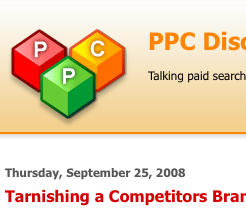 Recently I sat down with Jeremy Mayes, the author of PPCDiscussions.com. In addition to writing the PPCDiscussions.com blog, Mayes has used paid search to sell millions of dollars of products and has generated millions of leads for various industries. I asked him about 2nd tier pay-per-click opportunities and tips that he uses to run a successful paid search campaign.
Recently I sat down with Jeremy Mayes, the author of PPCDiscussions.com. In addition to writing the PPCDiscussions.com blog, Mayes has used paid search to sell millions of dollars of products and has generated millions of leads for various industries. I asked him about 2nd tier pay-per-click opportunities and tips that he uses to run a successful paid search campaign.
PeC: Many online retailers are focused on the big three PPC search engines, Google AdWords, Yahoo! Search Marketing, and MSN AdCenter. Why would an online retailer want to take a look at other PPC programs?
Mayes: Incremental cost effective conversions. If you feel that you have essentially saturated the primary PPC engines, then the 2nd tier PPC search engines can bring incremental sales, often a cost per conversion equal to or less than some of the major PPC search engines. 2nd tier PPC search engines often have fewer advertisers and a lower cost per click.
PeC: Are there any 2nd tier PPC programs that you think are worthwhile?
Mayes: Any PPC search engine that meets my minimum requirements for testing is a good candidate. I tend to look for PPC search engines that have traffic primarily from the US and that offer a solid reporting platform as well as top-notch customer service.
PeC: When testing out a 2nd tier PPC search engine, are there any tips that you could tell us that would help us?
Mayes: That’s a great question. In fact, there are several things that I do.
- Ask for a free test. If you’re a retailer with a decent PPC budget a 2nd tier engine that knows they deliver quality clicks won’t hesitate to give you a free test.
- If you can’t get a free test, make sure you spend enough on your test to get enough clicks to ensure the data has some statistical relevance. Generally speaking, you should know if something is going to work from and ROI point of view after 100 clicks or so.
- Monitor your traffic closely during the test. If you notice clicks coming from geographic areas you are not targeting or visitors from your test PPC program are exhibiting unusual behavior (high bounce rates, lower than normal time on page, etc) contact your customer service rep to discuss the issue. Quality providers will work with you to identify the issue.
- Set success/failure parameters for the test and stick with them. If at a $0.15 cost-per-click you need a 1% conversion rate for the campaign to be successful, drop the program if it doesn’t meet the objective. Even if it comes close to hitting your goals it is likely not worth the time to try and optimize specifically for a 2nd tier engine.
PeC: Do you suggest that someone use their analytics data from the major 3 PPC engines (Google, Yahoo!, MSN) and use that data to develop programs on other PPC search engines?
Mayes: Absolutely. When it comes to testing there’s nothing more valuable than your own data.
PeC: What is your view of click fraud nowadays, and do you think that the 2nd tier PPC search engines are handling this issue properly?
Mayes: As long as people and companies are paid by the click, click fraud will exist on every PPC engine. Regardless of what some engines will lead you to believe there’s no way any of them can filter 100% of fraudulent clicks. A quality PPC engine will issue refunds when you present them with data to support your click fraud claims. If they won’t or you feel like they are giving you a hard time just drop the program if the fraudulent click rate is impacting your ability to generate a positive ROI.
PeC: Do you have specific 2nd tier pay-per-click opportunities that you’d suggest?
Mayes: As far as recommendations, I’m always hesitant to provide them. I would hate for people to take that as some kind of endorsement of a particular service. That said, I’d at least check out Clickriver.com and Facebook.





